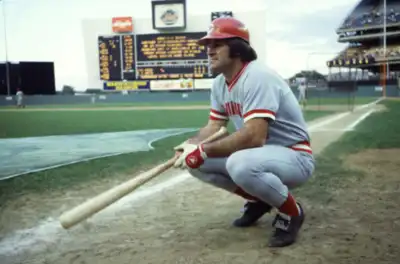ARTICLE AD BOX

How Pete Rose’s all-in mentality clashes with modern load management (Image Source: Getty Images)
Pete Rose's legendary "Charlie Hustle" mentality that defined baseball for decades now faces unprecedented scrutiny as Major League Baseball grapples with evolving player safety concerns and multi-million dollar contracts.
The debate intensified recently when New York Yankees infielder Jazz Chisholm Jr. advocated for a controversial "70% effort" approach, directly challenging the all-out hustle ethos that Rose embodied throughout his record-breaking career. This philosophical clash highlights a fundamental shift in baseball culture, where traditional grit meets modern sports science and economic realities that have transformed how teams manage their most valuable assets.
Jazz Chisholm Jr.'s revolutionary 70% theory challenges baseball's foundational principles

Jazz Chisholm Jr.'s revolutionary 70% theory challenges baseball's foundational principles (Image Source: Getty Images)
The way that Jazz Chisholm Jr. has chosen to defy all logic of baseball has caused a seismic rumble in the camp of traditionalists in Major League Baseball. New York Yankees infielder Aaron Boone made headlines when he confidently stated that he plays at 70 per cent in all aspects of the game (defence, offence, and baserunning) and that it improves performance and lowers the risk of injury. Seventy per cent: play defence, play offence, run, everything.
Stay healthy. You do not overswing. You just do not swing and miss quite as much, and you are a terrific player at 70 per cent, Chisholm Jr. told reporters.
This strategy is in direct opposition to the well-known philosophy of Pete Rose, which made him gain the nickname of Charlie Hustle in his Hall of Fame-calibre career. Rose, the 4,256-hit career leader who played the game with an intensity matched by few over 24 major league seasons, embodied that never-say-die attitude that came to be the gold standard in baseball.
His head-first slides, violent baserunning, and hustling after every play set the standard of full-out effort that Little League coaches continue to preach today.One cannot overlook the economic terrain backing the theory of Chisholm Jr. As the average salary in Major League Baseball topped $5 million in 2025, teams are more willing to protect their investments. The Juan Soto contract with the New York Mets of $765 million is an illustration of how money has become a factor in the concept of hustle and managerial judgment.
Los Angeles Angels manager Ron Washington leads old-school resistance to modern effort management
The most vocal critic of Chisholm Jr. and his philosophy is 73-year-old veteran manager Ron Washington of the Los Angeles Angels, who played in the late 1970s and 1980s. Washington played during the prime of Pete Rose, when hustle was not up for debate and players were benched on the spot for lackadaisical play. You present the appearance of 100 per cent at any time. Nobody is going to know you are 70 per cent unless you tell them you are 70 per cent, and then when they see you dog it, they can say, well, he is only 70 per cent, Washington explained to The Associated Press.The generational gap is not limited to personal views, but it also covers systematic transitions within the baseball culture. Veteran players used to patrol hustle themselves, says former Colorado Rockies All-Star Vinny Castilla, who would take aside a teammate who did not demonstrate enough hustle. The veterans come in and utter, Hey, man, you've got to do it. It is a daily hustle,' Castilla said, stressing that the hustle is the same.More current managers, such as Torey Lovullo of the Arizona Diamondbacks, however, promote a more realistic view, demanding "100 per cent of what you have" but lowering expectations depending on the condition of the player. This moderate philosophy would neither deny the competitiveness in Pete Rose nor would it ignore the modern knowledge of injury prevention and player wellness.Milwaukee Brewers manager Pat Murphy has perhaps the most advanced take on this, drawing a line between "eyewash" hustle, which is done to look involved, and being involved mentally.
In his analysis, it implies that the real hustle is about "being in the game, being on the game, being unrelenting in pitch-to-pitch preparation" - attributes that Rose displayed that were well beyond just physical effort.Also Read: Padres’ Jackson Merrill gets emotional sharing David Ortiz story from childhoodThe Pete Rose hustle argument is ultimately an indictment of baseball as a whole, as the sport moves on from a game of tradition to one that accepts analytics, player safety, and financial practicality. Although the 110% philosophy developed by Rose helped to establish the competitive base of the baseball game, the complexity of the modern game requires more advanced strategies of effort management that should consider performance, health, and economic factors.



.png)
.png)
.png)
















 18 hours ago
6
18 hours ago
6









 English (US) ·
English (US) ·